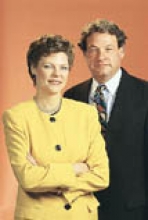James Baker’s last mission
Political insiders are buzzing with the question: will Mark Foley, the disgraced lawmaker, cost Republicans control of Congress? But Washingtonians with a longer view are asking a different question: Can James A. Baker III, the distinguished statesman, save George Bush’s presidency?
Baker is co-chairman of a bipartisan commission that is expected to recommend, after the election, significant changes in current Iraq policy. That report could represent the president’s last, best chance for a decent exit strategy. But does Bush want one?
At the moment, he seems more convinced than ever that his course is correct. As Bob Woodward reports in his new book, “State of Denial,” the president insists, “I will not withdraw even if Laura and Barney are the only ones supporting me.” Given the current desertion rate, Bush’s wife and dog might soon be the last loyalists left.
A key Senate Republican, John Warner, recently proclaimed that the American mission was “drifting sideways” in Iraq. If the escalating violence is not controlled within two or three months, he said, the White House has to ask: “Is there a change of course we should take?” Former Secretary of State Colin Powell weighed in: “Stay the course isn’t a good enough answer, because to stay the course you have to have a finish line.”









Comments